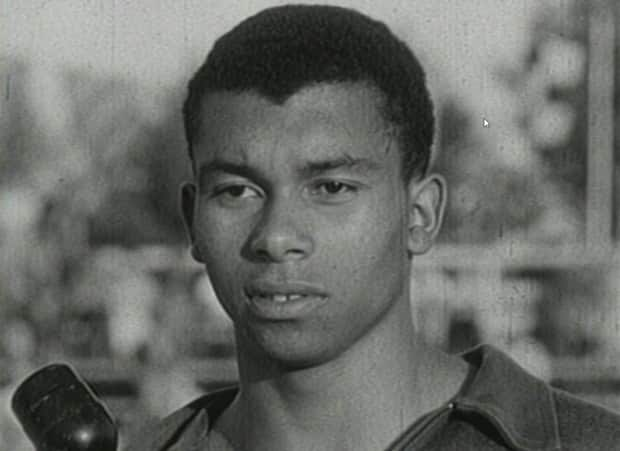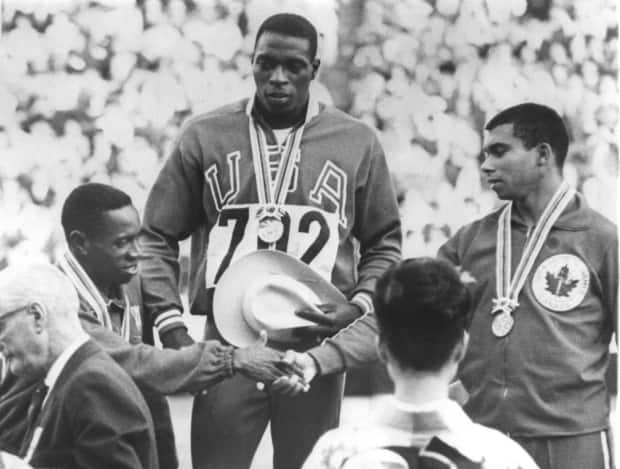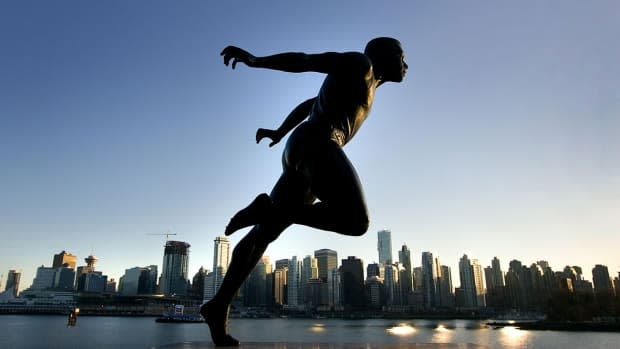Harry Jerome, attacked for being Black on his 1st day of school in 1950s, gets new track named after him

(CBC - image credit)
If Harry Jerome were alive today to learn that a new track in West Vancouver was being named in his honour, he would no doubt be pleased.
But if you told 12-year-old Harry, who was pelted with rocks by more than 100 students on his first day of school in North Vancouver, that, in the future, a nearby track would be just the latest in a long line of sports facilities to bear his name, he never would have believed it.
Such is the difficult history and inspiring legacy of the Canadian hero, whose story is once again in the spotlight with the announcement that a refurbished track coming to West Vancouver Secondary School will be called the Harry Jerome Oval.
"The Harry Jerome Oval will personify who he was. It will personify young people coming and developing themselves, and learning that when they fall, they can get up and try again," said Harry Jerome's sister and former Olympic track athlete Valerie Jerome in a video announcing the project.
Harry Jerome is recognized as one of Canada's greatest athletes and was named B.C.'s male athlete of the 20th century.

In 1960, he pulled off a rare double, owning the world records for both the 100-metre and 100-yard dash at the same time.
Over his career, he set seven world records, and won bronze in the 100 metres at the 1964 Tokyo Olympics, and gold at the 1966 British Empire Games and 1967 Pan American Games.
Jerome overcame serious injuries in his decade-long career, graduated from the University of Oregon with a bachelor's and master's degree before working as a teacher and promoter of youth sport.
He died in 1982 at age 42 from a brain aneurysm.
Valerie Jerome said while daily life wasn't always easy for her and her brother, track and field offered a place to excel.
The family moved from Saskatchewan to North Vancouver in the early 1950s, immediately running headlong into bitter racism in the form of a petition brought to city hall by neighbours who didn't want a Black family living on their street.
When the Jerome children started school, the hatred escalated into violence.

"Our first day of school was a nightmare — the rocks that rained down on our faces, our heads, our backs — and it wasn't 10 or 15 children, it was more than 100, maybe even 200. They were ready for us that morning, because their parents were already frustrated we had moved onto the street," said Valerie Jerome.
Later, Harry and Valerie found a safe haven at the Optimist Striders Track Club at Brockton Oval, not far from where Harry Jerome's statue now stands in Stanley Park.
"Our lives were transformed — not because of the medals or the trips or the international competitions — because we found a family," she said. "We were able to build self esteem, which had really been stolen from us in our early years."
The Harry Jerome Oval will join the growing family of Harry Jerome namesakes, including the Harry Jerome Community Centre in North Vancouver, the Harry Jerome Sports Centre in Burnaby, the Harry Jerome International Track Classic at Swangard Stadium, the Harry Jerome Indoor Games at the Richmond Oval, the Harry Jerome Track and Field Stadium in Prince Albert, Saskatchewan, the Harry Jerome Weight Room at the University of Oregon and the Harry Jerome Awards, recognizing achievement in the Canadian Black business community.
The Harry Jerome Oval is expected to cost $5 million. So far, the District of West Vancouver has pledged $2.2 million and another $1.4 million has been raised in the community.
For more stories about the experiences of Black Canadians — from anti-Black racism to success stories within the Black community — check out Being Black in Canada, a CBC project Black Canadians can be proud of. You can read more stories here.


